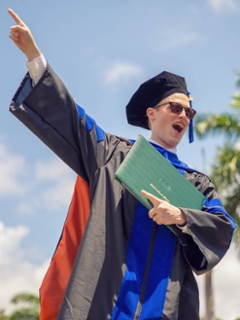A typical day in the lab for Brian Doherty involves analyzing huge data sets with supercomputers to improve machine learning for quicker and more precise calculations. However, Brian is not a data or computer scientist, Brian is a chemist. Trailblazing with innovative technologies such as artificial intelligence, Brian studies a relatively unknown branch of chemistry, called computational chemistry, which uses computer simulation, algorithms, statistics, and large databases to analyze chemical reactions. This branch of chemistry allows for more sustainable and eco-friendly lab practices, reducing the need for “trial and error” experimentation, saving lab materials and ingredients, and expediting calculations and results.
Brian, the Graduate School’s first Dissertation Fellow, was one of the first students to study machine learning for computational chemistry at the University in the lab of Dr. Orlando Acevedo, Associate Professor at the Department of Chemistry. His research made strides in improving not only the speed but also the accuracy of chemical calculations by supercomputers. “Calculations that would take a supercomputer six months to complete, now can be done in as little as two weeks,” he explained. “This allows us to explore more accurate chemical information at a faster rate.”
 Being at the forefront of this burgeoning field helped Brian land a postdoc at New York University funded by a grant from the U.S. Department of Energy. Immediately after graduating in May, Brian relocated to New York contributing his knowledge in computational chemistry and solvents to NYU’s Tuckerman Research Group to the study of liquid electrolytes inside batteries of renewable energy sources to make them more efficient.
Being at the forefront of this burgeoning field helped Brian land a postdoc at New York University funded by a grant from the U.S. Department of Energy. Immediately after graduating in May, Brian relocated to New York contributing his knowledge in computational chemistry and solvents to NYU’s Tuckerman Research Group to the study of liquid electrolytes inside batteries of renewable energy sources to make them more efficient.
Brian credits the Dissertation Fellowship as one of the main factors that contributed to his academic and professional successes of the past year. The Graduate School’s Dissertation Fellowship, established in 2018, awards $27,225 to one doctoral candidate in their final year of study so they can focus on writing and defending their dissertation without the obligation of a teaching, research, or graduate assignment.
The creation of the Dissertation Fellowship couldn’t have come at a better time for Brian. Towards the end of his fourth year in spring 2018, Brian had become increasingly worried as the NSF grant which provided funding for him as a research assistant had come to an end. Thanks to the Fellowship, he was able to fully dedicate himself to his research instead of relying on funding options like a teaching assistantship.
With his full focus on research, Brian was able to stay on track in the dissertation writing process and finish in a timely manner, as well as dedicate time to related projects which resulted in published work. He has already published four papers, three of them as first author, and he has three more publications pending approval. The most recent of these is a paper on applying a first of its kind machine learning technique to study a unique environmentally friendly solvent system.
“In general, the Dissertation Fellowship helped me in so many ways. Doctoral students go through so much stress, especially during the final year when we are writing the dissertation, looking for a job, and, for some, serving as a teaching assistant. Faced with so many competing responsibilities, in many cases I think the research ends up suffering since they do not have enough time to deepen their research or attempt to publish a paper. I am grateful to have had this opportunity,” reflected Brian.
Brian was fortunate to get a head start on the searching job process during the first semester of this final year, securing his dream postdoc in January, months before defending his dissertation. “It was a huge weight off my shoulders. It was better to manage that stress early on instead of at the end when graduation is looming,” he admitted.
Applications for the 2019-2020 Dissertation Fellowship are open now, apply here.

